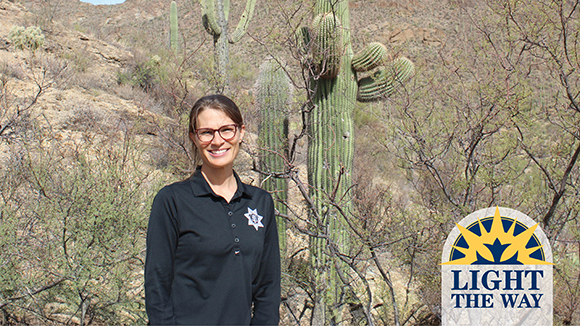Pima County, Arizona, sits on the edge of the Sonoran Desert, an unforgiving landscape along the U.S.-Mexico border that claims the lives of hundreds of migrants each year.

Since 2000, there are still 1,379 cases of unidentified deceased undocumented border crossers (UBCs) in Pima County alone. Forensic anthropologists like Jennifer Vollner, Ph.D., ’07 are working tirelessly to identify UBCs to restore their names and return them back to their families.
Vollner earned her biology degree from the Mount, her master’s from Mercyhurst College, and her Ph.D. from Michigan State. She always had an interest in forensic sciences but knew that job opportunities were limited. She credits MSJ faculty for their unwavering support.
“Dr. Beth Murray is the reason why I’m sitting here,” Vollner says. “Having her experience and connections really helped open some doors for me, and it continued even when I was in graduate school and into my early career. She never left me as a mentee. I joke with her now that she’s my ‘anthro mom,’ or my ‘academic mom,’” Vollner says.
Vollner specializes in the identification of skeletal remains and is on a team of three in-house forensic anthropologists in Pima County.
The challenge lies not just in the recovery, but also in giving a name to the anonymous.The brutal conditions of the Sonoran Desert often leave only skeletal remains, making the process long, complex, and dependent on costly DNA analysis.
“The extreme heat, the beating sun, and the lack of shade, water, and food leads, unfortunately, to a fatal experience,” Vollner says. “We have individuals going from recently deceased and visually recognizable to skeletonized much quicker than in other parts of the country.”
Pima County partners with a network of dedicated organizations such as foreign consulates, U.S. Customs and Border Protection, Non-Governmental Organizations, private labs, and sometimes even the FBI to aid in the identification process. Finding the families then becomes its own challenge with many individuals coming from very rural areas speaking only indigenous dialects. In these cases, the consulates play a crucial role.
“A common misconception is that these folks are all criminals,” Vollner says. “The act of undocumented crossing is not legal. But many of these migrants are trying to get back to their families after being deported, especially those with U.S.-born children. We also see a lot of first time crossers who are trying to get a job to support their families back home or escape dangerous situations in their home country. We run migrants’ fingerprints and DNA through our U.S. criminal databases with often no hits to a previous criminal act.”
The Pima County office has about a 64 percent identification rate, “which is pretty good because there are a lot of hurdles,” Vollner says. “No matter how long it takes us, we never stop pushing and we never stop investigating. As time goes on things will get better here and answers will be provided to families quicker. Even if it doesn’t seem like it, there is a lot of hope.”

